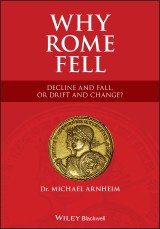Details

Why Rome Fell
Decline and Fall, or Drift and Change?1. Aufl.
|
26,99 € |
|
| Verlag: | Wiley-Blackwell |
| Format: | |
| Veröffentl.: | 14.03.2022 |
| ISBN/EAN: | 9781119691396 |
| Sprache: | englisch |
| Anzahl Seiten: | 496 |
DRM-geschütztes eBook, Sie benötigen z.B. Adobe Digital Editions und eine Adobe ID zum Lesen.
Beschreibungen
<p><b>Explore an insightful and original discussion of the causes of the fall of the Roman Empire</b> <p>In <i>Why Rome Fell: Decline and Fall, or Drift and Change?</i>, celebrated scholar of Roman history Dr. Michael Arnheim delivers a fascinating and robust exploration of the causes of and reasons for Rome’s fall in the West. Steeped in applications of elite theory to the later Roman Empire, the author discusses several interconnected issues that influenced the decline of Rome, including monarchy, power structure, social mobility, religion, and the aristocratic ethos. <p>Incisive comparisons of the situation in Rome to those in the Principate and the Byzantine Empire shed light on the relative lack of “indissoluble union and easy obedience” (in Gibbon’s phrase) in the later Roman Empire. Instead, the book reveals the divided loyalties of a fractured society that characterized Rome in its later years. <i>Why Rome Fell </i>also includes: <ul> <li>A thorough introduction to the transition from the ancient to the medieval world, including discussions of monarchy, Diocletian and his relationship to the aristocracy, and Constantine’s reforms</li> <li>Comprehensive explorations of the rise of the Roman Christian empire and Constantine’s role</li> <li>Practical discussions of conflicting theories of what caused the fall of the Roman empire, including the Pirenne thesis, the malaria hypothesis, Gibbon’s ‘decline and fall’ theory, and the role played by religion</li></ul><p> An indispensable resource for students, scholars and the general reader with an inquiring mind about history, <i>Why Rome Fell</i> deserves a place on the bookshelves of anyone with an interest in a sophisticated and original take on historical continuity and change.
<p>About the Author ix</p> <p>Preface xii</p> <p>Introduction 1</p> <p><b>Part I: Transition From The Ancient To The Medieval World And Beyond 11</b></p> <p>1. Rome: From Monarchy to Monarchy 13</p> <p>2. Diocletian: Hammer of the Aristocracy 60</p> <p>3. Constantine the Reformer 83</p> <p>4. The Christian Empire 118</p> <p>5. Continuity and Change 149</p> <p>6. Two Models of Government 197</p> <p><b>Part II: Conflicting Theories 261</b></p> <p>Prologue to Part II 263</p> <p>7. Varieties of History 273</p> <p>8. Gibbon’s The Decline and Fall of the Roman Empire 299</p> <p>9. The Malaria Hypothesis 308</p> <p>10. The Role of Religion 315</p> <p>11. The Pirenne Thesis 344</p> <p>12. “Late Antiquity” 357</p> <p>13. Assassination or Accommodation? 379</p> <p><b>Part III: Envoi 409</b></p> <p>14. Conclusion 411</p> <p>Glossary 433</p> <p>List of Primary Sources and Abbreviations 435</p> <p>Select Bibliography 439</p> <p>Index 452</p>
<p><b> Dr. Michael Arnheim</b> is a Sometime Fellow of St. John’s College, Cambridge, and a practicing London Barrister. After he was awarded his Ph.D at 25, his doctoral thesis was published by the Oxford University Press under the title of <i>The Senatorial Aristocracy in the Later Roman Empire</i>—the first of 23 published books to date. At age 31, Arnheim was appointed full Professor and Head of the Department of Classics at his old university in South Africa, subsequently returning to Britain to take the Bar.
<p><i>Why Rome Fell: Decline and Fall, or Drift and Change?</i> discusses the causes of the fall of the Roman Empire in the West in the context of concepts of monarchy, power structure, social mobility, religion, and the aristocratic ethos. Dr. Michael Arnheim, an accomplished scholar of Roman history, delivers compelling comparisons of the later Roman Empire with the Principate and the Byzantine Empire. Unlike (in Gibbon’s phrase) “the indissoluble union and easy obedience that pervaded the government of Augustus and the Antonines,” the later Roman Empire is revealed in this book as a fractured society rent by divided loyalties.</p> <p><i>Why Rome Fell</i> includes coverage of the transition from the ancient to the medieval world, exploring the monarchy, and the relationship with the aristocracy of Diocletian, by contrast with that of Constantine and his successors. It also discusses Constantine’s role in the rise of Christianity, together with the general significance of religion and religious persecution. There are also expansive treatments of conflicting theories, including Gibbon’s “decline and fall,” the Pirenne thesis, the malaria hypothesis, and the approach of the school of “late antiquity.” The book also explores the criteria for optimal professional history writing, with comparative case studies of a number of societies spanning three thousand years. <p>An indispensable resource for students, scholars, and the general reader with an inquiring mind about history, <i>Why Rome Fell</i> deserves a place on the bookshelves of anyone with an interest in a sophisticated and take on historical continuity and change.

















